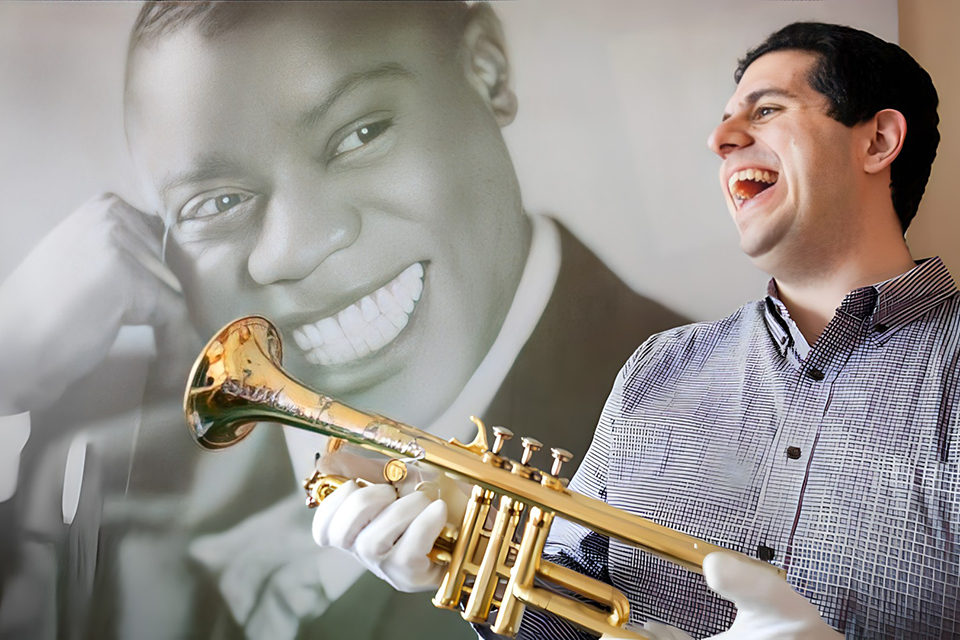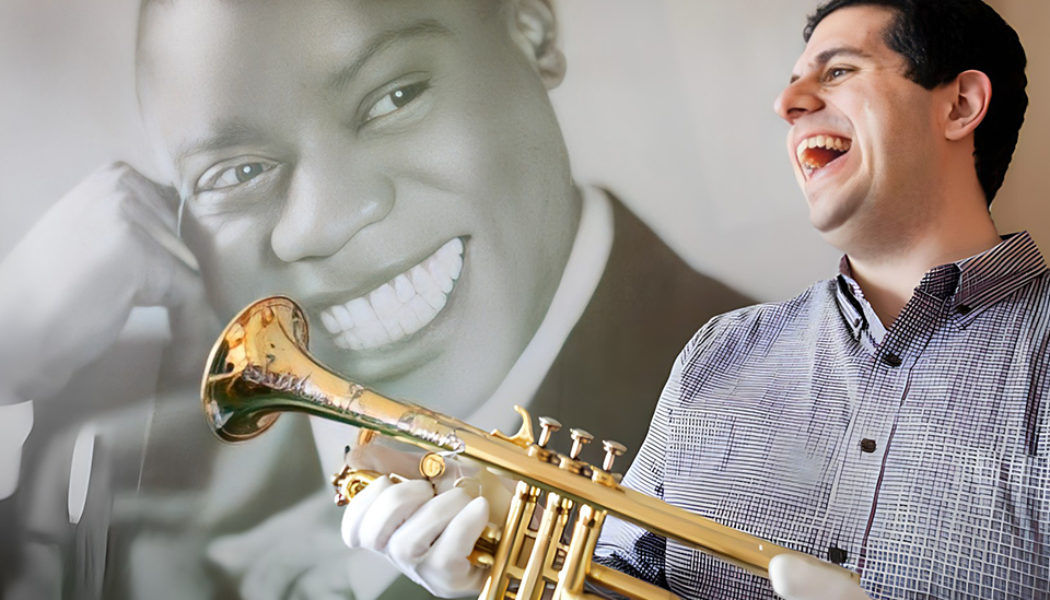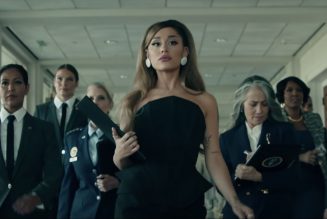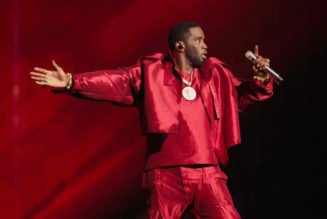
February 17, 2023
Jazz, swing, and pop icon Louis Armstrong was hailed during St. John’s University’s Black History Month Lecture as one of the greatest and most influential musicians of all time—a man who broke a multitude of color barriers through his music and singing, as well as his public stances against racial injustice.
“If you take anything away from this discussion, I would like it to be this: you can name a million great instrumentalists and you can name a million great singers, but Louis Armstrong is the only person you can name who completely changed the way that people played music on their instruments, and he completely changed the way the world sang. You just can’t find anybody else who was able to do any of those things,” said Ricky Riccardi, Director of Research Collections for the Louis Armstrong House Museum, which is located in the home Mr. Armstrong shared with his wife, Lucille, in Corona, Queens, NY.
Mr. Riccardi made his remarks this month as he virtually delivered the lecture, “The Wonderful World of Louis Armstrong.” The event was sponsored by St. John’s Department of History and the Africana Studies minor program. Jessica L. Harris, Ph.D., Assistant Professor of History and Director of the Africana Studies minor, hosted the lecture.
Mr. Riccardi is author of What a Wonderful World: The Magic of Louis Armstrong’s Later Years, and Heart Full of Rhythm: The Big Band Years of Louis Armstrong, which was named “Best Book of 2020” by Jazz Times magazine. In 2022, he won a GRAMMY Award for Best Album Notes that he wrote for a seven-CD box set, The Complete Louis Armstrong Columbia and RCA Victor Studio Sessions 1946–1966. He is also an accomplished jazz pianist.
Mr. Riccardi’s discussion of Louis Armstrong’s life and music included his early years in New Orleans, LA, where he was born in poverty in 1901; his groundbreaking recordings in the 1920s; his overseas tours as “Ambassador Satchmo,” at one point playing a concert behind the former Iron Curtain and throughout Europe and Africa; and the racist barriers he worked to upend.
By 1932, Mr. Armstrong was the biggest-selling artist in the recording industry and he began traveling with his orchestra around the country to expand the audience for his unique, and according to Mr. Riccardi, his “full, huge, golden” musical sound and scat-singing—a form of improvised jazz singing.
“But it was not easy for African American musicians on the road at that time,” said Mr. Riccardi. “They couldn’t stay overnight in any of the hotels for White people, nor dine in many restaurants because of their skin color, nor have access to public rest rooms. They had to enter the back entrances of venues where they were scheduled to perform and leave the same way.”
But during the Swing Era, which occurred from 1935 until World War II in the 1940s, the music great was also “breaking down one racial barrier after another,” according to Mr. Riccardi. Mr. Armstrong, for example, was the first Black musician to insert a clause in his performance contracts that stipulated he would not play in any hotel venues where he would be barred from overnight lodgings.
He was the first African American musician to assume the role of announcer on radio broadcasts. In 1936, Mr. Armstrong became the first Black musical artist to get featured billing with fellow White performers in a Hollywood, CA, film (Pennies from Heaven), that also starred famed singer Bing Crosby.
The biggest hit of Mr. Armstrong’s lifetime occurred in 1964 with the release of the song Hello, Dolly!, from the Broadway show of the same name.
“This took place at the height of Beatlemania, when the Beatles had 14 straight weeks of number-one hit songs and they were knocked off the top of the charts by 62-year-old Louis Armstrong,” Mr. Riccardi said, adding the Civil Rights Movement was in full swing during that period.
But the smash success of Hello, Dolly! was preceded by a change in attitudes toward Mr. Armstrong among younger Black musicians that emerged during the early and mid-1950s. “After years of breaking down all of those racial barriers and being a hero in the African American community, Louis Armstrong starts seeing a shift in his status, where a new generation of Black jazz musicians like Miles Davis and Dizzy Gillespie viewed him as a relic and pressed him to speak out more against racial injustice,” said Mr. Riccardi.
He noted that Mr. Armstrong, who always insisted on integrating his orchestras and bands with Black and White musicians, was very hurt by the younger musicians’ dismissal of him as exhibiting “Uncle Tom subservience,” or describing him as a “plantation character.” Said Mr. Riccardi, “It got pretty ugly and it deeply hurt Louis Armstrong.”
“In his mind, he was leading his fellow African Americans by example, but now folks want him to come out and say more,” he said.
The trumpet player did so in 1957 when an incensed mob of White people descended on Little Rock Central High School in Little Rock, AR, as it was being integrated by nine African American students, who became known as the Little Rock Nine. Then-Governor Orval Faubus mobilized the Arkansas National Guard to stop the integration effort and a virulent crowd of White protesters gathered for days at the school to scream, spit on, and curse the young students as they tried to enter the school.
Those hateful actions, which gained national attention, prompted Mr. Armstrong to angrily denounce the violence while he was interviewing with the press, said Mr. Riccardi. “He put his career on the line to speak out very publicly against racial injustice. He said, ‘Because of the way they are treating my people in the South, the US government can go to hell and [US President Dwight D. Eisenhower] has no guts’ for not sending in the military to protect the Little Rock Nine.”
As a result, Mr. Armstrong faced widespread criticism for his words of condemnation, even among prominent Black peers, such as Thurgood Marshall, former associate justice of the US. Supreme Court, and Adam Clayton Powell, Jr., the first African American to be elected to Congress from New York. “They thought his choice of words was too strong. It was not normal to be saying things like this in 1957. Then, entertainers were always patriotic and supportive of the president,” said Mr. Riccardi.
“Louis would not back down. He called the press and said, ‘No, I stand by everything I said,’” said Mr. Riccardi. “He said, ‘My people just want a fair shake. When I see on television or read about a crowd spitting and cursing at these youngsters, I think I have a right to get sore and say something about it.’”
“This was a defining moment of Louis Armstrong’s off-stage career—and it worked,” Mr. Riccardi said, noting Mr. Eisenhower subsequently dispatched federal troops to ensure the safety of the students as they entered the high school, which was successfully integrated.
“You can definitely learn how to be a better human being by studying the life of Louis Armstrong,” said Mr. Riccardi.









